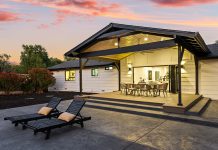As residents who are being profoundly impacted by one of the corporations profiled in the lead article in last week’s “Cannabis in Sonoma County” special report, we would like to take this opportunity to share additional information and insights with your readers.
To begin with, the caption, “Small growers find it challenging to step out of the dark,” is very misleading in the case of Vasco de Mello and Tatum Trantham. Despite de Mello’s and Trantham’s efforts to appear like small growers with existing ties to Sonoma County, it’s important to note that their corporation is a business group from Sacramento/Fairfield/San Diego which only recently changed its name from California West Coast Ventures, LLC, to Sonoma Reserve, Inc.
Unlike the other residents in our remote rural area, Sonoma Reserve, Inc. bought property out here solely as a commercial investment; they have shown no evidence of any investment in our community or in preserving its fragile ecosystem.
As further proof that Sonoma Reserve, Inc., is not a small grower but a corporation with ambitions that make it a vastly inappropriate addition to our community, we invite readers to consider Trantham’s claim that their goal is to be “the number one cannabis cultivator in the county,” and de Mello’s claim that they have already invested $800,000–$900,000 in their enterprise.
de Mello’s contention they are struggling to be in compliance with Sonoma County ordinances is also perplexing, given that Sonoma County has recently issued Sonoma Reserve, Inc., a second notice violation to stop cultivating, due to their non-compliance with the penalty relief program requirements and the cannabis ordinance operating regulations.
Although they have been notified that they are not allowed to truck in recycled water to their project, they continue to do so in direct violation of the Sonoma County notice and City of Healdsburg recycled wastewater use limitations. (Cannabis is not an allowed use for recycled water from Healdsburg).
The article dismisses concerns about water scarcity, traffic and the potential for crime in remote, rural neighborhoods like ours in a single sentence; however, we would like to note that these are very real issues.
Palmer Creek is in the Mill Creek watershed, which is defined as a critical habitat area by the state water board and the county. Just three years ago, the county required all residents in our water-scarce area to account for the source and use of every gallon of water we consumed.
Now, not only is Sonoma Reserve, Inc., illegally using recycled water to grow their current crop, but they are also proposing to build a million-gallon catchment pond on a forested mountainside, which will impact water availability and quality for our entire watershed.
The three-mile one-lane dirt road that serves as the only access to our community is a private road maintained by our neighborhood association. The first time any of us met de Mello and Tatum, they showed up at last summer’s yearly road association meeting, saying they were our new neighbors and asking if we would consider paving the road. (It’s worth noting that they never mentioned the reason for their startling request; nor did they offer to chip in on what would have been a million-dollar boondoggle.)
Now, their illegal water trucks are doing damage to the road on a daily basis; their excessive activity risks siltation of our creek, which is a Department of Fish and Wildlife designated Coho salmon restoration project and habitat. Once harvest begins and traffic is dramatically increased by seasonal workers, that damage will increase.
Security is another very real concern that is not so easily dismissed. Depending on the service requested, it has taken from 30 minutes (for an ambulance) to 75 minutes (for the sheriff) to reach our remote location. Given the risks posed by an easily transportable product with an eager black market, it’s hard to imagine that our safety won’t be significantly decreased by Sonoma Reserve, Inc.’s presence in our community.
We regret that de Mello brands the community he moved his operation into as the “enemy” for the simple fact that we wish to voice our opposition to his industrial operation and all of its detrimental impacts to our lives. As Rollie Atkinson notes in his commentary last week, every American has the right to agree or disagree “without fear of retribution or being called an enemy.”
Although we continue to support legal cannabis cultivation in appropriate locations, we are adamant in our conviction that Sonoma Reserve, Inc., does not belong in our remote rural area.
Jean Hegland, Douglas Fisher, Cindy and Gary Anderson, Cecile Isaacs, Norm Schneider, Ray and Nancy Turner, Ted Salkin, Pete Pistochini, Brian Griffiths, Laura Anderson, Toney and Nancy PrussiaMerritt, Carol Vellutini and Christine Madley are residents of the Palmer Creek area.








